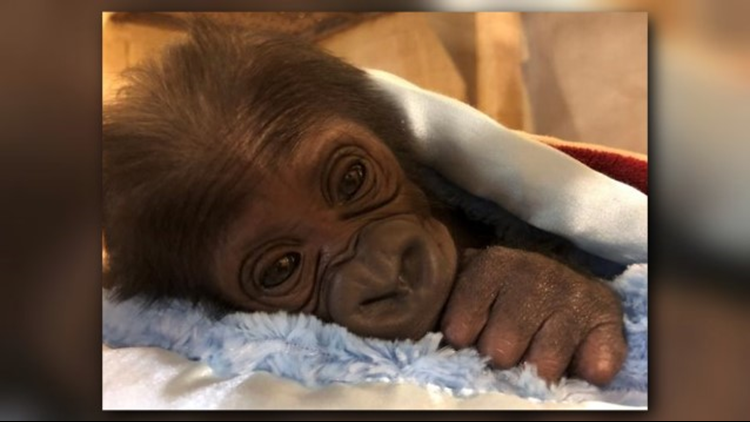The Jacksonville Zoo and Gardens has a new resident — a 4.8-pound female baby western lowland gorilla.
The infant, which has not yet been named, was born Friday.
Its mother, Kumbuka, 22, went into labor in the mixed-species habitat the gorillas share with colobus monkeys and mandrills at the African Forest exhibit, according to the zoo, but concluded in the birthing-suite within the gorilla shelter building.
As soon as labor was reported, staff members were able to call the gorilla family indoors so Kumbuka could be closely monitored in a quiet environment.
In spring 2017 the zoo learned that Kumbuka was deaf in both ears. Kumbuka’s initial maternal behavior toward the baby was perfect and normal, the zoo said. Unfortunately, she was cradling and carrying her youngster improperly — similar to the way that she behaved when she lost two previous offspring at another zoo.
It is theorized that Kumbuka’s hearing disability may prevent her from detecting when her youngsters are in distress, the zoo said. Faced with a life-threatening situation, the extremely difficult decision was made to remove Kumbuka’s baby for short-term assisted rearing by gorilla care staff. This decision is supported by the Association of Zoos and Aquariums’ Gorilla SSP (Species Survival Plan) group.
It was recommended she join the Jacksonville Zoo troop to learn maternal behavior from the other mother gorillas and participate in a maternal training program.
After her arrival in 2014, Jacksonville gorilla care staff began suspecting that Kumbuka may be hearing-impaired. Her condition was confirmed last year through consultation with audiologists from Nemours Children’s Specialty Care.
Her diagnosis provided valuable information for developing a specialized birth management plan to improve Kumbuka’s chances for maternal success, the zoo said. Throughout Kumbuka’s pregnancy, keepers worked to teach her the correct way to position an infant and other essential maternal skills, while also planning for the potential need to intervene based on her history.
Kumbuka is watching and learning as keepers provide around-the-clock care to the infant right next door to her and the rest of the gorillas, the zoo said. She can see and smell her baby and shows particular interest when the keepers demonstrate walking “gorilla-style” while holding the little one. Maintaining the close connection between mother and daughter is essential for a successful reintroduction.
Once the baby is strong enough to adjust herself, she can hopefully be reunited.
Keepers will care for the youngster for approximately the next four months. To ensure healthy socialization, the young gorilla will be kept near Kumbuka and the rest of the gorillas. Keepers are taking great care to provide mom with constant opportunities to look in on her baby. The newborn has many challenges ahead, but so far she’s progressing well, the zoo said.
“Welcoming the newest member of our zoo family is always exciting, and this little gorilla’s arrival is both special and challenging,” said Dan Maloney, the zoo’s deputy director of animal care and conservation.
Western lowland gorillas are listed as critically endangered based on population losses due to poaching, disease and habitat loss.
Kumbuka is the most genetically valuable female in the Gorilla Species Survival Plan, the zoo said, and after being recommended to pair with Lash, a silverback gorilla, she conceived in early February 2018. Lash, 42, came to the Jacksonville Zoo in 1998.
Their new daughter is very important to the entire North American program, which relies upon cooperative pairings of gorillas already in human care, the zoo said. Wild gorillas are no longer captured for zoos.



